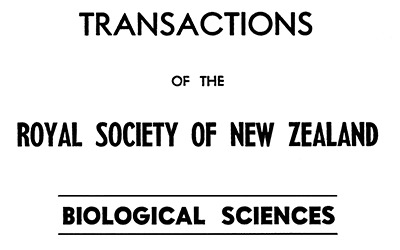- Magazines and Journals
- Explore
- Transactions of the Royal Society of New Zealand : Biological Sciences

Transactions of the Royal Society of New Zealand : Biological Sciences
All volumes
- Volume 11 No. 1
- Volume 11 No. 2
- Volume 11 No. 3
- Volume 11 No. 4
- Volume 11 No. 6
- Volume 11 No. 5
- Volume 11 No. 7
- Volume 11 No. 8
- Volume 11 No. 14
- Volume 11 No. 15
- Volume 11 No. 9
- Volume 11 No. 10
- Volume 11 No. 11
- Volume 11 No. 12
- Volume 11 No. 13
- Volume 11 No. 16
- Volume 11 No. 17
- Volume 12 No. 3
- Volume 12 No. 4
- Volume 11 No. 18
- Volume 11 No. 19
- Volume 12 No. 1
- Volume 12 No. 2
- Volume 12 No. 5
- Volume 12 No. 8
- Volume 12 No. 9
- Volume 12 No. 13
- Volume 12 No. 6
- Volume 12 No. 12
- Volume 12 No. 11
- Volume 12 No. 7
- Volume 12 No. 10
- Volume 12 No. 14
- Volume 12 No. 15
- Volume 12 No. 16
- Volume 12 No. 17
- Volume 12 No. 18
- Volume 12 No. 19
- Volume 12 No. 20
- Volume 12 No. 21
Background
Region
National
Available online
1968-1970
The Royal Society (known as the New Zealand Institute before 1933) published an annual collection of papers read before its various branches (the Transactions) in combination with accounts of the Institute’s activities, and the activities of its Board of Governors (the Proceedings) from 1869. In 1958 the Proceedings and Transactions were split and published separately.
From 1961 the Transactions were divided into four series: Botany, General, Geology and Zoology. In 1968 further changes were made when the number of publications was reduced to three when Botany and Zoology were combined into Biological Sciences. The first volume of Biological Sciences was published in 1970. As it continued the numbering sequence of Zoology, the first volume was published as Volume 11. Only two volumes of the Biological Sciences series produced.
As with the earlier series, papers were published separately, at irregular intervals and at greatly varying rates, so that the first Biological Sciences paper was actually published on 2 December 1968.
The editor was Burton Wallace Collins (1916-) and the associate editors were geomorphologist Sir Charles Cotton (1885-1970), botanist Bruce G. Hamlin (1929-1976) and zoologist Walter Clive Clark (1927-).
At the Annual General Meeting of Fellows of the Royal Society of New Zealand on 20 May 1970, an agreement was made that all further papers would be published in a unified periodical, the Journal of the Royal Society of New Zealand. The first issue of the Journal was published in June 1971, and the Biological Sciences, Earth Sciences and General Transactions ceased.
In 2017 the Journal of the Royal Society of New Zealand was still published by the Royal Society, alongside the six scientific journals that the Society took over in 1991 when the Department of Scientific and Industrial Research (DSIR) was restructured.
Copyright statement
In-Copyright Materials
In-copyright materials are made available under a Creative Commons Attribution 4.0 International licence. This means that you may copy, adapt and republish this material, as long as you attribute both the author and the Royal Society of New Zealand.
In-copyright taxonomic materials are made available under a Creative Commons Attribution No-Derivatives 4.0 International licence. This means that you may copy and republish this material, as long as you attribute both the author and the Royal Society of New Zealand.
For advice on reproduction of out-of-copyright material from this periodical, please refer to the Copyright guide.
Acknowledgements
This journal was digitised in partnership with the Royal Society of New Zealand.

 Log in
Log in